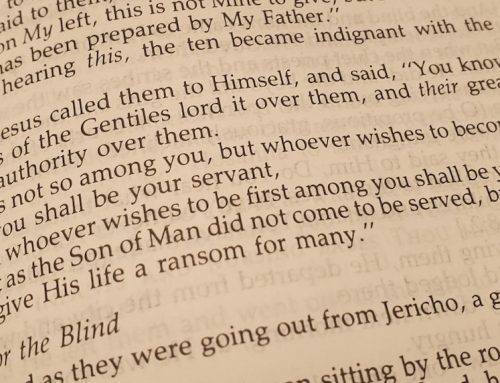 I have a public confession to make.
I have a public confession to make.
I believe the church’s practice of public confession, and all its associated rules, are simply more assumptions which have been mistakenly inferred and bound by men, not by the Bible. These manmade rules include:
- A weekly time of public confession.
- Private sins confessed before public ones
- A confession must be as public as the sin was
- Must stand for public confession
- A prayer must be offered after said period of public confession asking for the forgiveness of the people who confessed.
- You can’t take the Lord’s Supper if there is “sin on your soul” as a result of not confessing a “public sin” publicly
- If any one of these rules is violated, your sins are not forgiven. Start over until the process is completed properly.
We all know the church is big on public confession. This is a distinctive teaching that separates this church noticeably from other churches, and not just other Churches of Christ, by the way. Public confessions are a highly unique practice.
Stanton likes to refer back to Nehemiah 9 and 10 (a unique instance of a national confession of Israel) for a dubious Biblical precedent for this Sunday morning practice. But where exactly is this event referred to by first century writers, much less practiced by them? Spoiler alert—it’s not. Not even close.
Don’t get me wrong. Private confession, as the New Testament teaches, should be an important part of Christian life. It encourages humility, and restores relationships, when it is practiced between brothers and sisters who have truly offended one another. Public confession can even be a valuable thing as well, when a person’s desire for accountability leads them to expose their own weaknesses so the church body can support them in changing their ways.
But when you’ve just violated an entirely man-made rule, like the wrong color of lipstick, or not wearing nylons on Sunday…it is an unbelievable cheapening of what should be a deeply personal, and entirely optional, desire to humble yourself and expose your struggles to your brothers and sisters in Christ. Leadership hides behind the optional nature of public confession when it’s convenient (“If they have a sensitive conscience, who are we to tell them they can’t confess that?”), but denies it’s optional when defending the practice in general.
I’d like to suggest that if the church really, truly believes Nehemiah 9 and 10 are examples we’re required to emulate as a church body (and I don’t, for the sake of clarity), then the church ought to be fasting, wearing sackclock, standing as an entire assembly, reading from the Book of the Law, and confessing the collective sins of the church over the past 50+ years for a quarter of the day. And since we’re paying attention to details, and we don’t know what God might strike us dead for, don’t forget some dust on the head:
Nehemiah 9:1-3 On the twenty-fourth day of the same month, the Israelites gathered together, fasting and wearing sackcloth and putting dust on their heads. Those of Israelite descent had separated themselves from all foreigners. They stood in their places and confessed their sins and the sins of their ancestors. They stood where they were and read from the Book of the Law of the Lord their God for a quarter of the day, and spent another quarter in confession and in worshiping the Lord their God.NIV
What sins has Stanton committed as a church body? How about starting with teachings imposed out of a desire for fake unity that have since been rescinded?
Things like withdrawing from people unscripturally and unjustly, publicly defaming the character of people in front of their wives (in fact, BY their wives), and children, for their private thought lives or private sexual addictions, teaching and providing moral support for the breakup of marriages, affecting generations of children who had to grow up in a split family as a result. Let’s just start with these things for now.
Look at the human cost of these collective “national sins” of Stanton. Aren’t they a little more impactful than the normal Sunday morning confessional litany of so-called sins, like speeding a little, or not wearing nylons, or failing to obey some other obscure rule in 2 Opinions Chapter 3?
The irony of Stanton’s embrace of Nehemiah 9 and 10 is stunning—absolutely stunning—when you think about it. Stanton “proves too much” in defending public confession based on these passages, because if they apply them to the church, then they don’t affect sins done privately, but public sins of the collective assembly. Say, for instance, the collective sins the church acted on “in unity,” yet in error. That is highly damning.
Rather than scrubbing history to whitewash and minimize these errors in doctrine, wouldn’t it be more consistent with Stanton’s own teaching to just admit these sins, and confess them as such? Just come clean, admit that the church taught erroneously, and sinned greatly by offending “one of these little ones” in the process. If a confession should be as public as the sin, then I think it’s reasonable that people who have left Stanton because of past offenses, and whose family lives and personal life trajectories may have been forever altered because of them, be made aware if Stanton actually repents from any of these past sins and offenses. There have been real, human costs to these sins, and they are not to be brushed off lightly.
For those of you who have been sinned against by Stanton’s unbiblical teachings and unloving practices, I encourage 100% forgiveness. For your sake, not theirs. Don’t carry around the hurt. Lay it at the cross, and let Stanton carry its burden alone. They are destroying themselves. But Stanton also needs to own up to the mess they’ve created in so many families’ lives.
Remember this oft-quoted verse?
Isaiah 9:16 – Those who guide this people mislead them, and those who are guided are led astray. NIV
When Stanton chooses, as a church body, to lay their collective sins at the cross, they, like you, can experience true freedom in Christ. Until then, let’s pray for them to experience the love and forgiveness that the gospel is really about by seeking true reconciliation with the people they’ve hurt by their unbiblical doctrines.
What about Matthew 5?
But what about Matthew 5, you ask? Doesn’t that mandate the confession of public and private sins before we can take the Lord’s Supper, as Stanton teaches?
Matthew 5:23-24 – Therefore, if you are offering your gift at the altar and there remember that your brother or sister has something against you, leave your gift there in front of the altar. First go and be reconciled to them; then come and offer your gift.
Stanton’s interpretation of this is ludicrously out of context, if you really think about it. Jesus is preaching the Sermon on the Mount in this chapter primarily to the Pharisees, long before the Lord’s Supper was ever introduced. His point, pure and simple, is to slap the Pharisees around for thinking they could have a fine relationship with God while they are at odds with their brother.
Mind you, Jesus is not talking about one Pharisee having seen another Pharisee doing something wrong, and having to legalistically “correct” it with him chronologically prior to approaching God with an act of worship so that God will accept said act of worship. No, that’s our legalistic human minds trying to make a formula out of what is truly a matter of the heart.
This is about a broken relationship between two people. Yes, he’s setting up a principle, but it isn’t a principle imposing a regulatory chronology, but a priority of the heart. He’s saying, “how dare you think you are so righteous before God just because you’re doing all your outward acts of service correctly, while at the same time refusing to mend a broken relationship with your brother? Fix the relationship with your brother.” That’s your priority.
A deafening silence about public confession
If public confession was a weekly practice, as Stanton has made it, and it was such a central part of the first century church’s doctrines on forgiveness of sin, it is mind boggling that we don’t have a single recorded mention of a church or individual doing it. Not even in 2 Corinthians 2, Paul’s letter to that congregation telling them to accept the man who had repented of sleeping with his father’s wife. Wouldn’t that have been an ideal time to tell them to have the guy stand before the congregation and confess his sin—and ask forgiveness for it—publicly?
It’s noteworthy that the man had already shown a repentant heart without ever having come before the church publicly. The church had completely expelled the man from the assembly, per Paul’s instructions in 1 Corinthians 5, and sometime between then and his second letter, had changed his ways. The church, meanwhile, was continuing to “punish” the man by rejecting him from the group, and Paul is writing to them telling them to stop and accept him once again. He doesn’t say to have him come before the church and confess before he can take the Lord’s supper again.
Any fair reading of the New Covenant Scriptures leaves a deafening silence about any first century church practice of public confession. That’s because it was not something they did. Did someone occasionally feel a personal need to come before the congregation to confess their faults one to another? We might guess that the man in Corinth, and maybe others, did. But that would be pure speculation, upon which we’d be foolish to establish a church doctrine or practice. We simply have no historical evidence…Biblical or otherwise…for this teaching. To bind this practice on Stanton’s churches, as it has done for 45+ years, is one more example of “teachings for doctrines the commandments of men.”


 I have a public confession to make.
I have a public confession to make.




I agree with your take on this, Kevin. I do know that Stanton was recording the confessions at some point ( I don't know if they still do) but back then, if that person strayed again and confessed the same thing then they would keep records of it. Where is the forgivenesss & love? We have felt the tragedy of this practice in our own family that is still going on today. I would like to hear your understanding on the marriage rules that they have. They seem to find a "scriptural" reason for divorce if it suits them or… Read more »
A reply to this is more than two years overdue, sis. 🙂
At some point, I'll write more about the marriage and divorce issue, but I can recommend a book that helped to change my thinking on this:
Divorce & Remarriage, by Rubel Shelly
I know I really hurt you when you and Don got married and I didn't attend. I hope you've forgiven me for that, and I love you and miss Don tons.
When I was missing a lot of time, because of my disability, it was put out, I don't remember if personally or publicly, a bout where are my public confessions. That is personal and nobody's business. Which takes me to a statement that you made, Kevin, "offending one of these little ones". The church right now is in the state of where they are not considering this. Many will do or say things to you that will offend you, but will not see it. I was asked why I didn't confess to a "sin" that my teachers made it plain… Read more »
The only reason to record confessions is to use that information to wield power over people. I don't think the record confessions anymore (I'm not sure, I could be wrong), but it's clear from Lynn's comments that confessions in general are still used to manipulate people.
BTW, just a quick reminder, let's try to keep names to a minimum. People do change and move on, and I think it's important for this blog to promote forgiveness, not resentment or bitterness. Thanks for all the commenters who make this a safe place for so many to speak out.
I agree Kevin, that is why I use the words preachers and teachers in place of who said, but use Gary and Tom because they are two of the most predominate voices that leads them. I think that if the statements I reiterate just came from anybody else it wouldn't carry as much weight, but I get your point and will comply.
Virtue is its own reward. Virtue makes you strong mentally and morally. Practicing virtue (the christian teachings) will also make you superior in many way to those who walk after thier vices. Christ was superior to all other men and in his superiority he chose to serve his fellow man. The pharisee on the other hand practice the commandments of God and became arrogant and disdained his fellow man. The Pharisee did a good job at turning their fellow jews into religious slaves. Christ came and taught a different way and they hated him. I realized that my teachers had… Read more »
I read a lot of the articles from the "Truth Magazine" in the 1950s and 1960s. You can see were a lot of the churches went off. They left off studying and thus forgetting that we are children of God. Our teachers and preachers may have the responsibility of the congregation, but they are also held responsible for how we treat each other and is becoming a huge problem in the congregations right now and to many people can't see it. Ezekiel 34:4 The diseased have ye not strengthened, neither have ye healed that which was sick, neither have ye… Read more »
Those who do not know history are doomed to repeat it, and there is nothing new under the Sun SAID Solomon. Somehow it is imagined that the Stanton CHURCH of Christ can almost completely ignore the past 2000 year's of human history and man's failures and successes in trying to obey the Bible, and STILL miraculously manage to accidentally stumble across truth. Truth doesn't yield herself UP that easily. Confessing minor traffic violations, falling asleep in class, coming in LATE, are staples of the Stanton CHURCH of Christ and it wouldn't be so BAD except they exhort and extort every… Read more »
Martin Luther can only be one person, and my man, you know I love you but you have got too much time on your hands.
Actually Frank he makes pretty good sense. I'm with you Martin.
@concerned, I thought you were defending Stanton. So you're with @martin luther on his call for reform?
I defend truth where ever it may be found. And sometimes it can be found in very strange places.
I'm glad that you addressed this Kevin! I stopped making public confession while I was still sitting amongst the sect. The reason was that I couldn't find any scriptural support for it.I even went back over Merie Weiss' letter on public confession, hoping that I would find those missing scriptures. But what I found instead was that her letter was filled with so many opinions, and instructions, but very few scriptures. And the ones she included were the ones you addressed. I realized that the sect was not following scripture on this issue, and that nowhere in the NT did… Read more »
Thank you Debby, and I'm glad you reached the same conclusions. I'm also glad you found the blog! Happy to have your insight and comments!
When I was missing a lot of time, due to my infirmity, the teachers were starting to make it know that they couldn't figure out why I wasn't making public confessions. To me, it seemed like they thought they had to control when and if you needed to make public confessions.
They would also tell you that your confession, whether private or public, held no merit if it wasn't memorable.
I know what you mean, Lynn! One of the tactics of control, and mind control in particular, is to instil fear into members, and to use intimidation. Does this sound familiar? Disagreeing with leadership is to disagree with God! Your teachers are godly and spiritual and you are (gasp!) carnal! You aren't able to understand things as your teachers do because you are full of pride! Character assassination is used to create and maintain that guilty feeling in your gut, and to keep others from listening to you. I found it was used on me when my teachers found they… Read more »
In the SCOC obedience is understanding. I was taught exodus 4:16 your teachers are your god. Teacher worship is not only expected but demanded by some.
Debby, could you please post your story? I would like to hear your background and your present situation if you would be so kind. I enjoy your posts, they are very reasonable and I value your input. Is there a way to contact your privately? I would like more info on a situation you wrote about when you first started posting.
TO Seeker,Kevin has my story, I emailed it to him. However, I can briefly tell you that I was baptized in Portland, Or in 1985. Moved to Lakeland, Fl in 1989. The congregation was moved to Tampa, Fl around 2000. I left in August 2006.The reason I left is because circumstances made me realize that I could not stay and be quiet concerning things I was seeing, and experiencing. After leaving what I call Merie's group, I studied even more. It's been a long journey, I've had to face a lot of things about myself as well as why I… Read more »
I completely understand why you wouldn't want to make your email public. I'll set up something through Kevin if he's of a mind to do so. I think the phrase 'of a mind' might make you smile 😉
Seeker, that phrase did make me smile! 🙂 How did you know? Do I know you? it does make me curious! If you do know me, you know that I am a person who wants to know things, I do have an inquisitive mind. It got me into trouble in Merie's group, and bad motives were attributed to me because of it. But really, it was just that I simply took the scripture "and in your getting, get understanding", very seriously. I wanted to know, AND I wanted to understand. I still do!I find that I am still learning, and… Read more »